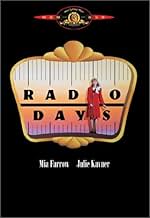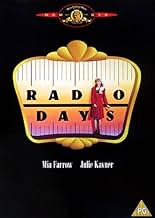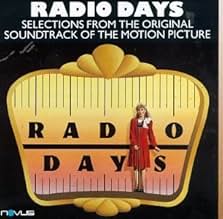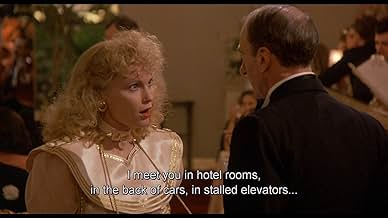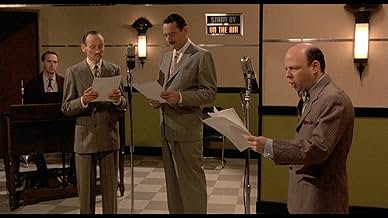Ein nostalgischer Rückblick auf das goldene Zeitalter des Radios, in dessen Mittelpunkt eine normale Familie und die verschiedenen Radiodarsteller stehen.Ein nostalgischer Rückblick auf das goldene Zeitalter des Radios, in dessen Mittelpunkt eine normale Familie und die verschiedenen Radiodarsteller stehen.Ein nostalgischer Rückblick auf das goldene Zeitalter des Radios, in dessen Mittelpunkt eine normale Familie und die verschiedenen Radiodarsteller stehen.
- Für 2 Oscars nominiert
- 3 Gewinne & 10 Nominierungen insgesamt
- Avenger Crook
- (as Michael Murray)
- Ceil
- (as Renee Lippin)
Empfohlene Bewertungen
What a beautiful, kind, gentle, ironic, warm, sentimental (in a very good way and yes, I am talking about Woody Allen's movie, that's right) yet perfectly balanced delight. It is a series of sketches about young Joe (young Allen, of course, played by Seth Green - that was a surprise), an adolescent in Brooklyn, NY during 1930s-1940s who was passionately in love with radio which was a king. The film is a tribute to the magical radio days and the myths and legends about radio personalities, the memory of a grown man who never forgot where he came from, the love letter to his always fighting and arguing ("I mean, how many people argue over oceans?") but loving relatives and a very funny comedy (the way only Allen's comedy can be). It is the film where pretty like a doll and painfully naive Sally (Mia Farrow) asks who Pearl Harbor is? Where gorgeous Diane Keaton sings and Diane Wiest, his beloved Aunt Bea never gives up hope of one true love. He never told us if she found it...
"I never forgot that New Year's Eve when Aunt Bea awakened me to watch 1944 come in. I've never forgotten any of those people or any of the voices we would hear on the radio. Though the truth is, with the passing of each New Year's Eve, those voices do seem to grow dimmer and dimmer."
The Radio days are gone but thanks to Allen, the voices of the times passed are still clear and sound and they always will be.
9/10
He takes the wonderful old songs and commercials from that time and weaves them into the story. I was completely captivated.
It's not a "laugh a minute" type film, but it also gets you thinking. Nevertheless, it has some hilarious scenes. Check out the Jewish fasting holiday scene. I've watched it at least 6 times and I still laugh. Also the scene with Mia Farrow's character was superb. One of my favorite lines is when she tells a top radio producer in her high-pitched nasal voice, "Jeez. We can't keep meeting like this. In the backs of cars, movie theaters and stalled elevators. You're gonna lose your respect for me!" I love this film.
Woody delivers a loving tribute to the concept of radio through the eyes of childhood. This has a large cast with wide ranging vignettes. It's imaginative, touching, and fun. The characters are specific and compelling. There is a terrific veneer of memory. Through all the surreal and the real, there is the love of family and radio that transcends the screen onto the audience.
I've watched this movie with senior citizens who were around in the forties. I once watched it with a Jewish guy who grew up on Long Island (albeit in the early 30's, not the 40's). All comments were the same: THIS was life in New York during wartime.
Vietnam was my war, so this era was a mystery to me. However, any time a genius like Woody Allen can create a film that not only makes me and my rowdy friends laugh, but gets guffaws from my dear old Mom as well, it deserves a little fanfare.
I didn't even mention the solid gold music.
See this film at once!
Well, I was wrong about Woody. This film shows it.
Autobiographical -- or perhaps semi-autobiographical -- in nature, "Radio Days" evokes the time when people returned "to those thrilling days of yesteryear," and for whom, quite probably, it was equally thrilling to contemplate the magic of a box in their living room that could cause them to "watch" the stories unfold in their minds. "Remotes," or on-the-spot broadcasts transported them to the scene of unfolding tragedies or triumphs in a way that newspapers never could (and which TV, for all its advantages, rarely matches).
And yet the film, for all its authenticity in recreating studio practices (watch, for example, how the actors drop completed script pages onto the floorrather than turning them and risking a tell-tale rustle of paper), isn't really so much about radio itself as it is about the people who listened, as personified by one raucous, cantankerous and loving Brooklyn family. Beautifully evoked, particularly by Julie Kavner (Mother), Michael Tucker (Father), and the incomparable Dianne Wiest (as the perenially lovelorn Aunt Bea), it is their reactions to what they hear on the radio -- whether listening breathlessly to the war news (at a time when the end result was anything but certain) or Bea's abandonment in the middle of nowhere by a panicked suitor as Orson Welles' "War of the Worlds" broadcast takes hold -- that bring to life the era and the power of that medium.
Standouts? The whole cast is perfect, but for me, in addition to those previously mentioned, I have to cit Mia Farrow's portrayal of the dim-bulbed Sally White, who transforms herself with the aid of speech lessons into a radio personality. (For that matter, catch Danny Aiello as a less-than-brilliant hitman, particularly his scenes with Dina DeAngeles as his mom.)
Criticisms? One: At the end of a poignant scene in which young Joe has finally discovered what his dad does for a living, Allen insists on falling into some standby "schtick" in his voiceover. (I guess he couldn't resist; thankfully, it doesn't ruin the moment.)
Ultimately, of course, it is the era itself that this film celebrates. Faithfully, and lovingly, it is recreated with a skill that points up its absurdities at the same time it makes one hopefully nostalgic. And, if you're not very careful, you wind up falling hopelessly in love with this funny, obscure Brooklyn family.
And to the end of my days, I'll always wonder whether poor Aunt Bea ever did find her "Mr. Right" . . .
Wusstest du schon
- WissenswertesThe story of Kirby Kyle, the ill-fated baseball player, is a parody of former Chicago White Sox pitcher Monty Stratton, whose promising career was derailed after he lost part of his leg due to a hunting accident. Stratton attempted a comeback and then retired. His life was made into a movie: The Stratton Story (1949).
- PatzerIn one scene, a pack of Camel cigarettes lies on a table, with a clearly visible bar code on the side of the package. The Universal Product Code would not be introduced until the 1970s.
- Zitate
[Last lines]
Narrator: I never forgot that New Year's Eve when Aunt Bea awakened me to watch 1944 come in. I've never forgotten any of those people or any of the voices we would hear on the radio. Though the truth is, with the passing of each New Year's Eve, those voices do seem to grow dimmer and dimmer.
- SoundtracksThe Flight of the Bumblebee
(1899-1900)
Music by Nikolai Rimsky-Korsakov
Performed by Harry James
Courtesy of CBS Records
Played during the opening credits
Top-Auswahl
Details
- Erscheinungsdatum
- Herkunftsland
- Offizieller Standort
- Sprachen
- Auch bekannt als
- Días de radio
- Drehorte
- Radio City Music Hall - 1260 6th Avenue, Rockefeller Center, Manhattan, New York City, New York, USA(Joe, his Aunt Bea and her date see a movie there)
- Produktionsfirmen
- Weitere beteiligte Unternehmen bei IMDbPro anzeigen
Box Office
- Budget
- 16.000.000 $ (geschätzt)
- Bruttoertrag in den USA und Kanada
- 14.792.779 $
- Eröffnungswochenende in den USA und in Kanada
- 1.522.423 $
- 1. Feb. 1987
- Weltweiter Bruttoertrag
- 14.792.779 $




